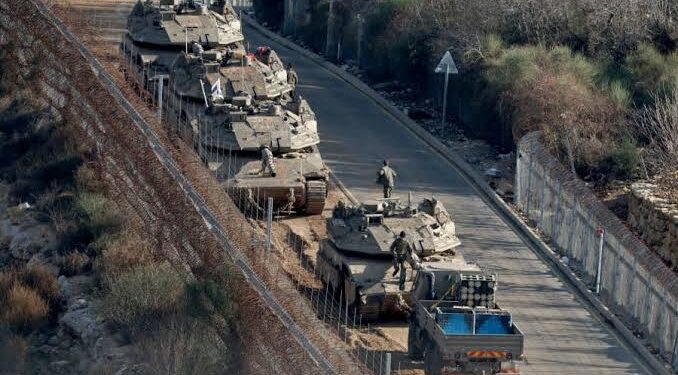For the first time since 1974, Israeli tanks have reportedly crossed the border fence into Syria. This significant move comes shortly after Israeli officials announced plans to strengthen their military presence in response to escalating tensions in southern Syria. The Israeli newspaper ‘Maariv’ reported that this action aims to prevent Syrian forces or civilians, regardless of their affiliations, from approaching Israeli positions.
Diaspora Affairs Minister Amichai Chikli emphasized the need for Israel to establish a “new line of defence” based on the 1974 ceasefire agreement. This line is located at Mount Hermon in the occupied Golan Heights, a region Israel seized from Syria during the 1967 war and later annexed in 1981—a move not internationally recognized.
Israeli Tanks Enter Golan Heights
On Sunday morning, Israeli tanks crossed the border fence in the Golan Heights, marking a rare land incursion into southern Syria. Al-Manar news agency reported that this development signals the beginning of Israel’s ground invasion into the region. According to Zionist media outlets, the Israeli military’s actions are concentrated in the Quneitra area, strategically located in southern Syria.
Shifting Dynamics in Syria
This military maneuver unfolds amidst a rapidly evolving political and military landscape in Syria. Reports indicate that armed rebel groups have taken control of Damascus, a significant blow to President Bashar al-Assad’s regime. These developments have prompted Israel to reactivate its defensive strategies in the region.
The incursion reflects heightened concerns within Israel about the potential spillover of conflict from Syria. The Israeli government has made it clear that it seeks to prevent any forces, whether loyal to Assad or the opposition, from nearing its borders.
Historical Context of the Golan Heights Conflict
The Golan Heights, a strategically vital plateau, has been a flashpoint since Israel captured most of the territory during the Six-Day War in 1967. Although a ceasefire agreement was reached in 1974, tensions have remained high. Israel’s recent actions signal a significant shift in its approach to managing the border with Syria.
This incursion underscores the broader regional instability and raises questions about the future of Israeli-Syrian relations as both countries navigate a complex web of military and political challenges.
Related Stories:
Assad regime collapses as Syrian rebels seize control of Damascus
Turkiye, Russia, Iran meet in Doha to seek solution to renewed Syria crisis
Escalation in Northern Syria, Civilians Face Grave Risks Amid Rising Violence
















